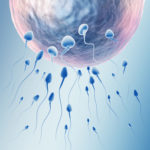
New study reinforces importance of testing for DNA damage in sperm
A recent article in the Independent, also picked up by a number of UK newspapers, discussed the role of the male in recurrent miscarriage. A small study carried out in the Imperial College London showed that in couples with recurrent miscarriage, the male sperm was of lower quality and had significantly higher amounts of DNA damage within the sperm itself.
Although this study is useful, this is not news to us! We have been advocating testing the DNA within sperm for a number of years. Our Research Director and nutritionist Glenville Nutrition published a medical paper on this very subject in 2014 (link in this blog post) and has spoken at a number of medical conferences on the role of nutrition in protecting against this kind of DNA damage.
When to get tested
When you decide to start trying in earnest, or perhaps you are already trying and it is taking longer than expected, it is advisable to get this test done from the get-go along with a regular semen analysis. A regular semen analysis really looks at the structure of the sperm and how well it can get from A to B to fertilise the egg. However, sperm are carrying precious cargo, namely the paternal DNA, and we need this to be protected along the arduous life and journey of a sperm. When the precious cargo is damaged, this can cause problems with the developing embryo.
Often women will get the ‘usual’ checks with their GP, that is tests for hormone levels and thyroid function, but it is definitely best to get the male partner checked also from the beginning. There can be huge disappointment and frustration if you have gone down the road a few months or even years, and only then to discover there is something wrong.
Improving the DNA within sperm
The good news, and a great reason to get checked from the start, is that DNA quality can often be improved. The damage is caused primarily by inflammation or infection which can be reduced with the help of diet, lifestyle and medication as necessary. Avoid smoking which is an important source of damage and check for any exposures to harmful chemicals, either in the workplace or via your hobbies such as gardening or household renovations.
You can also simultaneously increase your own protective defences by improving your nutrition. The source of our natural defences against DNA damage comes from our diet, specifically in the form of antioxidants found in fruits, vegetables, nuts and seeds.
- Aim to reach 7-10 portions of fruit and vegetables per day and vary the colours. We say ‘eat a rainbow’ to maximise the different types of necessary antioxidants naturally through your diet
- Snack on a portion of mixed nuts per day and add seeds such as pumpkin or sunflower to your breakfast, yoghurt or salads
- See our menu plans here which we devised for the Sims IVF to support their patients
DNA damage within sperm can play a role in miscarriage and difficulty conceiving, particularly if you have been told that there is no discernible reason for your losses or if you have been told you have ‘unexplained infertility’. The good news is the test is simple and in most cases, the DNA damage can be markedly improved, significantly increasing your chances of a healthy pregnancy.

